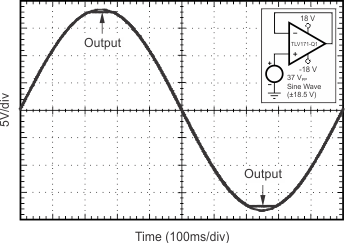SBOS516H September 2010 – June 2024 OPA171 , OPA2171 , OPA4171
PRODUCTION DATA
6.3.3 Phase-Reversal Protection
The OPAx171 family has an internal phase-reversal protection. Many operational amplifiers exhibit a phase reversal when the input is driven beyond the linear common-mode range. This condition is most often encountered in noninverting circuits when the input is driven beyond the specified common-mode voltage range, causing the output to reverse into the opposite rail. The input of the OPAx171 prevents phase reversal with excessive common-mode voltage. Instead, the output limits into the appropriate rail. Figure 6-1 shows the performance.
 Figure 6-1 No Phase Reversal
Figure 6-1 No Phase Reversal| PARAMETER | MIN | TYP | MAX | UNIT |
|---|---|---|---|---|
| Input common-mode voltage | (V+) – 2 | (V+) + 0.1 | V | |
| Offset voltage | 7 | mV | ||
| vs temperature | 12 | µV/°C | ||
| Common-mode rejection | 65 | dB | ||
| Open-loop gain | 60 | dB | ||
| GBW | 0.7 | MHz | ||
| Slew rate | 0.7 | V/µs | ||
| Noise at f = 1 kHz | 30 | nV/√ Hz |